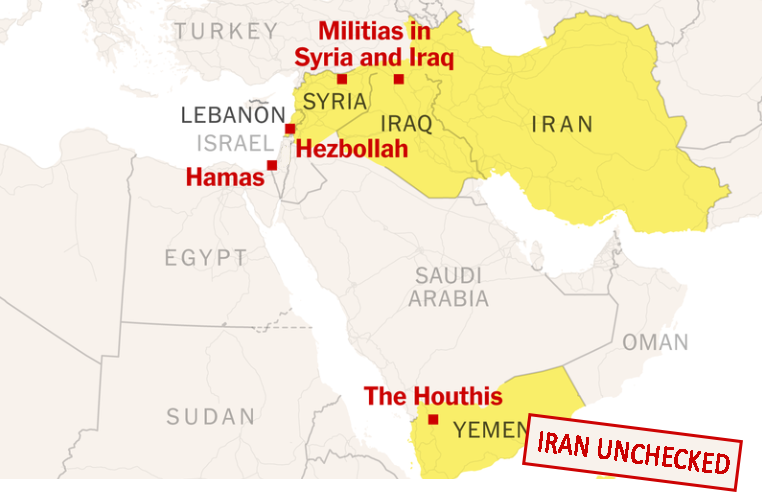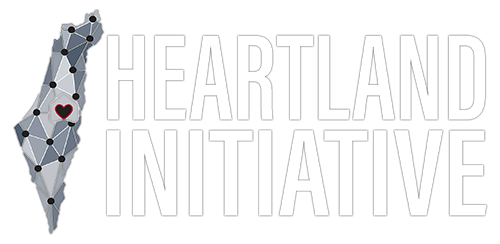
A Strategic Blueprint for Disarming Iran's Proxies and Holding Tehran Accountable
By Gedaliah Blum, Senior Partner Heartland Initiative
The Middle East has long been destabilized by Iran’s strategic manipulation, where it has armed and directed proxies such as Hezbollah, Hamas, and the Houthis to wreak havoc across the region. This tactic has not only threatened the security of nations but has prolonged conflicts and inflicted untold suffering on civilian populations. As Israel contemplates its next moves, it’s clear that a more strategic, methodical approach is necessary to counteract Iran’s influence and pave the way for the regime’s ultimate downfall.
Over the past two decades, Hamas alone has fired many tens of thousands of rockets into Israeli territory, and Hezbollah maintains an arsenal of approximately 150,000 missiles along Israel’s northern border. These are not mere numbers; they represent a continuous existential threat, sponsored and sustained by Iran. Recent escalations involving sophisticated Iranian weaponry—300 advanced rockets, drones, and ballistic missiles—targeting Israel further confirm Tehran’s direct involvement and its abandonment of any pretense of non-engagement.
Given these circumstances, Israel must take a firm stance: Iran will be held accountable for any actions taken by its proxies. As Israel strategically dismantles these groups, the onus is on Iran to pressure its proxies towards pacification and disarmament. Failure to do so will not only leave Iran isolated and without a future in the international community but will also place it on the receiving end of a heavy military response.
The strategy should involve the following decisive actions:
- Israel will issue a clear ultimatum to Iran: control your proxies, ensure they disarm, or face direct and severe military consequences. This means that any aggression by Hamas, Hezbollah, or the Houthis will be viewed as an act of war by Iran itself.
- Systematically dismantle the operational capabilities of these proxies. For Hezbollah and Hamas, this means disabling their ability to launch attacks from Lebanon and Gaza. For the Houthis, it involves cutting off the military aid and strategic guidance they receive from Tehran.
- Leverage international support to impose stringent sanctions on Iran until it complies with demands to cease all support for terrorist activities and disarms its proxies. This diplomatic pressure must accompany military readiness to show Iran that its current path leads only to increased isolation and economic devastation.
While I believe this approach to be rational and justifiable, I am also acutely aware that the Iranian regime does not operate on the same rational or moral plane. Their actions are often dictated by what they perceive as a religious obligation to either remove or convert non-Muslims from the region—a fundamentalist stance that compromises any potential for peaceful coexistence.
However, Iran’s recent responses to international reactions following their barrage of rockets reveal a crucial insight: there is an element of self-preservation at play. Despite their rhetoric and aggressive posturing, the regime showed a reluctance to escalate the conflict further, indicating a possible end to the conflict. This acknowledgment of self-preservation is what we must capitalize on.
Israel’s approach will send a clear message to Tehran: control and disarm your proxies, or the international community will no longer consider you a legitimate actor. Israel, by holding Iran accountable for the actions of its proxies, underscores a commitment not only to its own security but also to the stabilization of the entire region. Through this strategic weakening of Iran’s external points of influence, Israel aims to foster conditions conducive to the regime’s eventual collapse.
In this scenario, Israel’s military actions—paired with diplomatic maneuvers—will ensure a reduction in regional hostilities and set a precedent for holding state sponsors of terrorism accountable. It is a path that demands resilience and patience but promises a more stable and secure future. This is not just about neutralizing immediate threats; it’s about systematically dismantling a regime’s ability to wage proxy wars. By cutting off the tentacles of the Iranian regime first, we can ultimately work towards neutralizing the head.
Gedaliah Blum is the founder of the Heartland Initiative, a platform enhancing global engagement with Israel, and Dapei Katom, which supports family-run businesses in Israel’s heartland.

